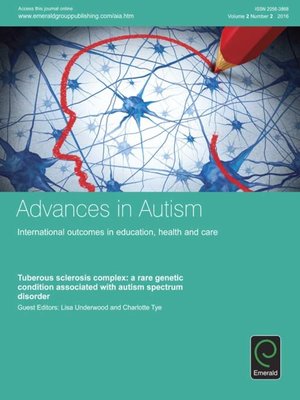Advances in Autism, Volume 2, Number 2
ebook ∣ Tuberous Sclerosis Complex: A Rare Genetic Condition Associated with Autism Spectrum Disorder · Advances in Autism
By Jane McCarthy

Sign up to save your library
With an OverDrive account, you can save your favorite libraries for at-a-glance information about availability. Find out more about OverDrive accounts.
Find this title in Libby, the library reading app by OverDrive.



Search for a digital library with this title
Title found at these libraries:
| Library Name | Distance |
|---|---|
| Loading... |
Welcome to this e-book of Advances in Autism on Tuberous Sclerosis Complex (TSC). TSC is a rare genetic condition associated with a high incidence of autism spectrum disorder (ASD). The aim of this issue is to raise awareness of TSC among the ASD research community and demonstrate the relevance of TSC to broader neurodevelopmental and psychiatric research.TSC is a useful model system for understanding ASD for several reasons. The prevalence of ASD is high in TSC, much higher than the general population (e.g. Bolton, 2004, Jeste et al., 2008). Despite this, phenotypic presentation is highly variable, so a moderate proportion of TSC cases do not develop ASD. This can provide valuable insight into the causal pathways leading to the emergence of ASD. Furthermore, the molecular and biological mechanisms involved in TSC are well characterized, providing a more tractable model (Huang and Manning, 2008, Orlova and Crino, 2010); Finally, a degree of homology has been demonstrated between idiopathic and syndromic ASD, suggesting similar pathways are involved (e.g. Bruining et al., 2014).While not solely focused on ASD, the chapters in this e-book provide an overview of current TSC research, viewpoints and case studies, which taken together provide a backdrop for stimulating further research in this field in order to further our understanding of ASD and improve services for individuals and their families.







